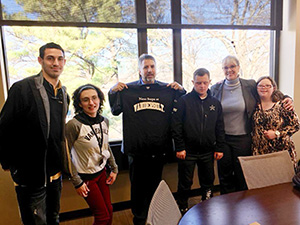Vanderbilt Kennedy Center (TN UCEDD, LEND, IDDRC) Explores the Right to Make Choices
March 19, 2018

|
Noted disability public policy advocate Jonathan Martinis, J.D., senior director for Law and Policy at the Burton Blatt Institute at Syracuse University, delivered the Vanderbilt Kennedy Center's (TN UCEDD, LEND, IDDRC) Martin Luther King, Jr., Commemorative Lecture "Supported Decision-Making: Protecting Rights, Ensuring Choices" in January 2018.
Martinis focused his talk on introducing the theory and practice of Supported Decision-Making (SDM), which is a process that protects a person's right to make his or her own life decisions, and is a viable alternative to conservatorship.
The lecture topic was timely as the 2018 session of the 110th General Assembly in Tennessee reconvened on January 9 and will likely vote on a bill filed by Sen. Becky Massey (R-Knoxville) and Rep. Mike Carter (R-Ooltewah) during this session. Several states have already passed supported decision making laws.
For further information on the bill, click here.
Martinis has visited Nashville on several occasions to consult on SDM, and even testified before the Senate Judiciary Committee on the topic in 2017.
In his MLK lecture, Martinis reminded attendees that everyone uses SDM to make decisions about their lives. Each time we go to a doctor or a mechanic, for example, we are relying on the expertise of another to assist us in making a choice. Martinis argues that Individuals with disabilities should have the same rights to make decisions about their own lives.
Martinis is no stranger to arguing for the right to make choices. In Summer 2013, he represented a young woman named Jenny Hatch, who won a landmark legal battle protecting her right to make her own life decisions using SDM, instead of being subjected to guardianship. You can read more about Jenny's case at the Jenny Hatch Justice Project.
Nationwide, people with intellectual, developmental and other disabilities are often placed under guardianship or conservatorship, losing their rights to make basic, fundamental decisions like where to live, what to do, and whom to see. In most cases, this is done in a sincere effort to protect the individual from abuse or neglect or exploitation. Or it may done in order to allow family members access to medical care/decisions, educational records/decisions, or to assist with financial decisions. Supported decision-making shows great promise for increasing self-determination and improving quality of life outcomes.
VKC LEND Trainees enter the SDM conversation
Trainees in the Vanderbilt Consortium LEND (VCL), a program that prepares graduate-level health professionals in 15 disciplines to assume leadership roles to serve children with neurodevelopmental and related disabilities, have been working on a group project related to SDM. Under the supervision of Elise McMillan, J.D., co-director of the VKC UCEDD, Erik Carter, Ph.D., professor of Special Education and a VKC member, and Carol Rabideau, L.C.S.W., VKC UCEDD social worker, trainees are:
- Reviewing materials and resources on SDM with particular attention to what currently exists for health-related resources/documents. Possible publication or publications may result from this review.
- Interviewing individuals and families about their understandings of SDM, and identifying what resources would be helpful to them. Possible publication or publications may result from this review.
- Developing training materials with particular emphasis on materials for those in health-related fields about decision-making options and their discussions with patients and families. These materials will be designed for both in-person and on-line trainings.
- Assisting in the area of policy development with a statewide working group that includes the VKC UCEDD, the Tennessee Council for Developmental Disabilities, Disability Rights Tennessee, The Arc Tennessee, the Statewide Independent Living Council, and Family Voices of Tennessee.
To learn more about Supported Decision-Making, see the resource list below.
- Supported Decision-Making: Creating a Continuum of Choice
This paper on supported decision-making is a collaborative effort of The Arc Tennessee, Disability Rights Tennessee, Family Voices of Tennessee, the Statewide Independent Living Council, the Tennessee Council on Developmental Disabilities, and the Vanderbilt Kennedy University Center for Excellence in Developmental Disabilities. - National Resource Center for Supported Decision-Making
This Center provides information and resources on SDMabout the Right to Make Choices - the right we all have to make our own decisions and direct our own lives. - The Right to Make Choices: International Laws and Decision-Making by People with Disabilities
The resource for self-advocates includes helpful examples and resources for implementing SDM.







